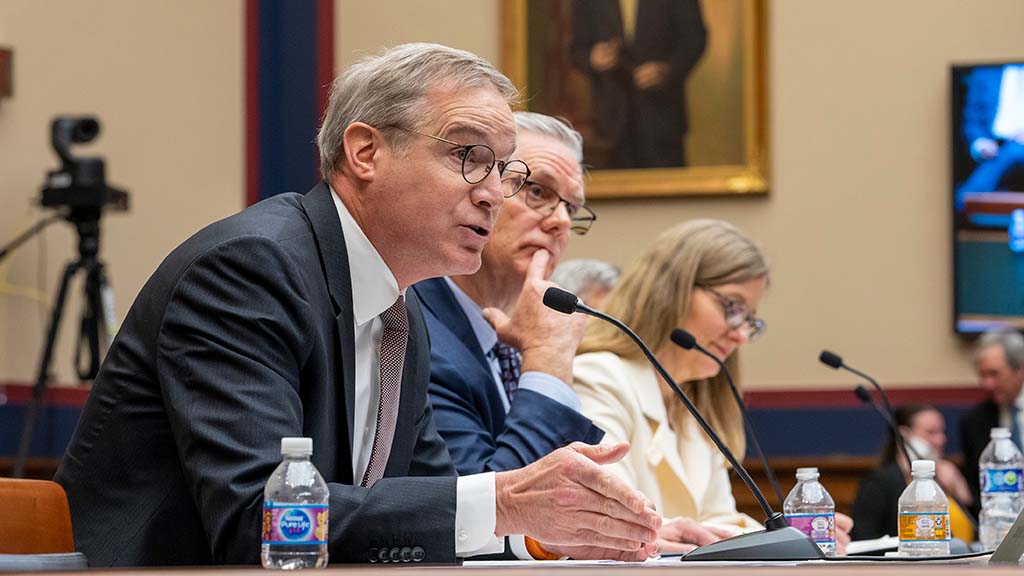
Trucking's workforce is the heartbeat of the economy. The 7.65 million men and women who embody our industry are the glue that holds the supply chain together. Without them, this country would grind to a halt.
It is imperative Congress pursues policies that strengthen and empower this essential workforce—and stops polices that threaten to undercut it. ATA President and CEO Chris Spear was back on Capitol Hill to deliver that message directly to lawmakers at a hearing before the House Education and Workforce Committee.
Here are four takeaways for Congress:
Protect independent contractor choice.
For 90 years, the U.S. economy and supply chain have benefited from the choice of individuals to run their own trucking businesses. More than 90 percent of motor carriers operate six trucks or fewer, many of whom started as independent contractors and continue to choose that business model for themselves.
Talk to independent contractors and they'll tell you why they make that choice. Perhaps it's the pursuit of a dream to start, manage, and grow their own business. Or it's the freedom to be their own boss and earn on their own terms. For many it's the ability to determine their own schedule, and the flexibility that comes with seasonal or part-time work.
Regardless of their individual reasons, they choose that path, forming an indispensable link in the supply chain that ensures our industry has the capacity and flexibility to respond to the economy's growing freight demands.
It's lamentable that officials at the state and federal level want to rob ICs of that choice. California's AB5 law essentially outlawed the business model, upending the livelihoods of nearly 70,000 drivers in the state—drivers like Dee Sova, who was forced to uproot from her family in California and move to Missouri because of AB5. The PRO Act, legislation introduced in Congress, seeks to replicate AB5 at the federal level, and a proposed rulemaking at the U.S. Department of Labor would have a similar effect.
These measures are nothing but a crude ploy to force small-business owners into becoming company drivers—a political favor to big labor union bosses wanting to grow their membership.
Passing the PRO Act and enacting the Labor Department's proposed rule would have devastating effects on the supply chain. Our message to lawmakers: Should you continue down this dangerous path, you will own the economic and political consequences.
Reform federal workforce programs to reflect today's realities.
The trucking industry is currently short 78,000 drivers and 41,000 technicians. Yet over the next decade, trucks will be tasked with moving 2.4 billion more tons of freight than they already do today.
Drivers on average earn nearly $70,000 in salary plus full benefits, all without the requirement of a college degree and the debt that comes with one. Pay has risen more than 19% over the last five years—higher than any other mode. But pay raises alone cannot solve the driver shortage, as evidence shows many drivers opt to drive less as they earn more.
The post-Covid landscape gives Congress an opportunity to realign workforce programs with the realities of today's labor market, so that federal investment is directed where the greatest needs and opportunities exist. In reauthorizing the Workplace Investment and Opportunity Act, Congress should acknowledge reality and define trucking industry jobs as essential, skilled, and in-demand – facts that were made abundantly clear throughout the pandemic.
Invest in the next generation of trucking.
Trucking has an aging workforce that well exceeds the national average. Over the next decade, the industry will need to hire roughly 1.2 million new drivers to keep pace with retirements and growing freight demand. We encourage Congress to explore initiatives that will expand the pool of qualified drivers (and technicians) and reduce backlogs in their development.
Initiatives like the DRIVE-Safe Act, which would remove the federal ban on interstate commerce for 18-20-year-old drivers will raising safety and training standards far above today's bar. Whereas 49 states plus the District of Columbia permit this population to operate Class 8 commercial vehicles within their state, federal rules prevent these same drivers from crossing state lines.
Balance the supply chain, trade, and public health with common sense.
ATA successfully challenged the Biden Administration's COVID-19 vaccine mandate before the U.S. Supreme Court, which struck down the employer vax requirement in a 6-3 decision. However, the cross-border vaccine mandate on drivers entering the U.S. from Canada continues to have an adverse impact on our industry and supply chain. Trucking moves more 73% of all U.S.-Mexico-Canada surface trade. When unnecessary policies like this take capacity offline, it puts added strain on our workforce and its ability to service the economy's freight.